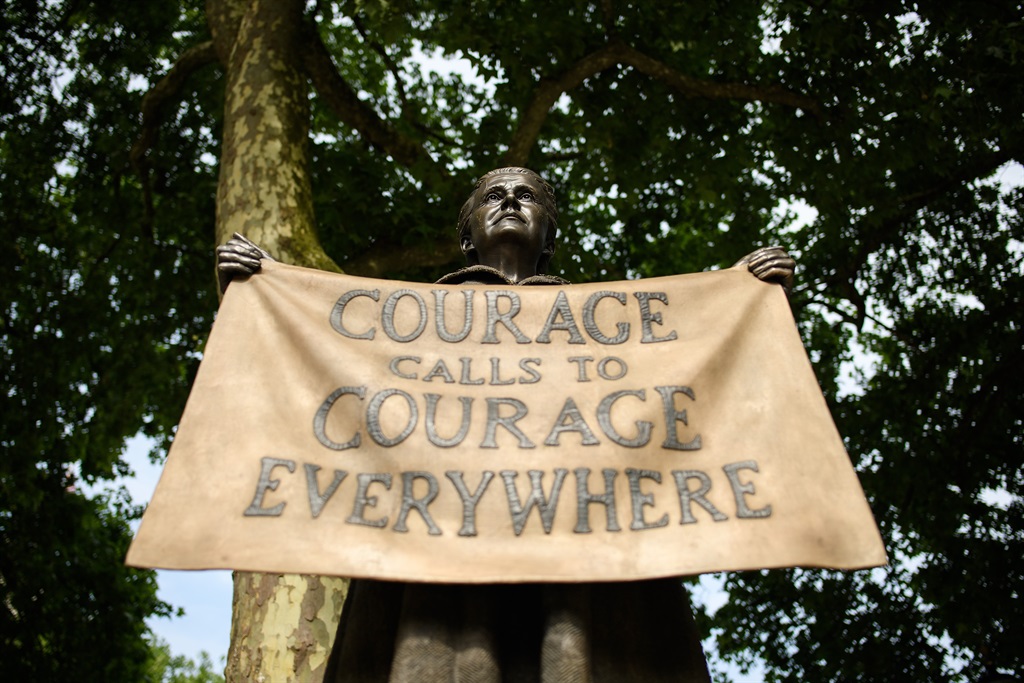
The backstory around the statue of Millicent Fawcett in London led Juliana Claassens to reflect on the nastiness and infighting that accompanies many struggles for liberation and its aftermath.
During a recent visit to London, we stumbled upon a statue of a middle-aged woman on Parliament S.
quare, holding up a sign with the words "Courage calls to courage everywhere".
The stately presence of this statue, her piercing gaze, and particularly the words she held up deeply resonated with me. This feminist figure's exhortation to take courage reached out across time and space and offered a word of encouragement to passersby, who stopped to pause.
Perhaps they, as I have done, were thinking of the many difficult battles for justice in which they are involved: for women, but also for so many others who feel excluded, marginalised, slighted and demonised due to their sexual orientation, ethnicity, nationality, social standing, and mental and physical capabilities. Without knowing her name or story, I took courage from her courage that calls for courage everywhere.
Controversy with statue
On the plaque, I read that this woman holding the sign on Parliament Square is Millicent Fawcett (June 11, 1847 – August 5, 1929), a British activist and writer who, from 1897–1919, headed up the UK's largest women’s rights association, the National Union of Women's Suffrage Societies. As I further went looking for her online, I found that Millicent's very presence in Parliament Square has a remarkable backstory – with quite a bit of controversy associated with the statue and its reception.
Millicent Fawcett's statue was inaugurated by the then Prime Minister Theresa May in 2018 – making her the first woman to join the male leaders on Parliament Square. Millicent took her rightful place on the Square thanks to the efforts of another feminist activist and journalist, Caroline Criado Perez, who, while jogging across this space in 2016, was troubled that there was not a single female represented.
Perez's campaign lobbying for the inclusion of a statue of one of the suffragettes on Parliament Square was successful but not without its share of controversy. For instance, the feminist community was deeply divided regarding which feminist leader should be honoured this way.
In an article in the Guardian called "A new feminist statue is a great idea. Shame they picked the wrong feminist," Rachel Holmes made a case that it should have been one of the other suffragists like Mary Wollstonecraft, the mother of the feminist movement in the UK, or Emmeline and Sylvia Pankhurst who was on the frontlines of the suffrage movement. Holmes argued that they opted for a "safer" choice of Millicent Fawcett, who for many years was in a leadership position and not in the direct line of fire.
Infighting
There also has been quite a bit of controversy about the actual statue itself, designed by the female artist Gillian Wearing. Some of the first responders said it looked like Millicent was hanging up the washing! I found it quite ironic that her vast feminist contribution is reduced to doing laundry. The statue was fixed, moving her hands to the top of the sign, and she took her place on Parliament Square, perpetually proclaiming her message of courage.
The controversy surrounding Millicent Fawcett's statue got me thinking about the nastiness and infighting that accompanies many struggles for liberation and its aftermath. I remember the time during my student days when a prominent feminist icon came to talk to female students about our place in the church and our relationship (or not) with feminism.
She told the story of a visitor shown around hell with its humongous pots of boiling water and the weeping and gnashing of teeth associated with this place of wretchedness with people desperately trying to escape. One pot, though, was eerily quiet, with no movement at all. "What is this," the visitor asked his guide. "It is a bunch of women. They are pulling one another down…."
This story of how women who find themselves in struggles everywhere work against one another and pull one another down instead of having each other's backs haunts me to this day.
On Women's Day, we commemorate one of the most profound displays of female resistance and solidarity across divisions of race and class. I am sure that behind the scenes, and before and after the Women's March on this day in 1956, there may have been similar spats, feuding, backstabbing, and incidences of pulling one another down.
Nevertheless, despite such very human complexities and inevitabilities, the statue of Millicent Fawcett on Parliament Square continues to call for courage everywhere. May we, in the spirit of feminists past and present, individually, collectively and in solidarity, continue to labour for justice, equity, and a better world.
- Prof Juliana Claassens is Professor of Old Testament and Head of the Gender Unit in the Faculty of Theology at Stellenbosch University.
*Want to respond to the columnist? Send your letter or article to opinions@news24.com with your name and town or province. You are welcome to also send a profile picture. We encourage a diversity of voices and views in our readers' submissions and reserve the right not to publish any and all submissions received.
Disclaimer: News24 encourages freedom of speech and the expression of diverse views. The views of columnists published on News24 are therefore their own and do not necessarily represent the views of News24.




 Publications
Publications
 Partners
Partners























